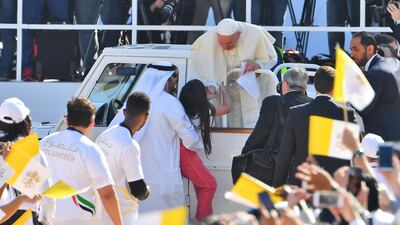There is an old story of human folly and hubris, versions of which appear in both the Old Testament Bible and the Quran.
It tells of a mighty king who ordered the construction of a colossal tower so that he might climb to the heavens and confront God face to face.
Instead, the tower collapsed and in its ruins, people discovered they could no longer communicate with each other; they had lost the common tongue.
In English, the name of this tower – Babel – has morphed into the word babble, meaning a confusing melee of many voices.
The events of the past week might remind us of that ancient tale, except this time the story is reversed. The visit of Pope Francis to the UAE has shown we can find a common voice and that with goodwill and determination, it can be reclaimed from the rubble of centuries of mistrust and conflict.
So much has happened in the short time that the Pope spent here that it will take months or maybe many years for its significance to become fully clear.
It was, as we were constantly reminded “historic”, the first visit by the head of the Roman Catholic Church to the Arabian Peninsula, the land of the Prophet Mohammed and the birthplace of Islam.
The immediate impact of Pope Francis’s visit is almost photographic in its imprint. The moment, at the airport, when the Pope embraced his friend, Dr Ahmed Al Tayeb, Grand Imam of Al Azhar Al Sharif University and Chairman of the Muslim Council of Elders.
Then there was the celebration of mass at Zayed Sports City Stadium, a public expression of faith and spirituality by 150,000 Christians that reflected the openness and tolerance of the UAE's leaders towards those whose faith is not Islam.
That day might be also remembered for one moment – when a young girl ran to the Pope to hand him a letter as he entered the stadium and was lifted up by an Emirati security official so that the pontiff might lay his hand on her head in blessing.
These moments, heartwarming and uplifting as they are, will not singly take us down the road of peace and tolerance. It is also the less visual work that will plot a path forwards for all faiths.
The two-day Human Fraternity Conference was a remarkable coming together of the world's religions – Muslims, Christians, Jews, Hindus and Buddhists, among others, meeting in quiet conversation and with goodwill, to look for a way we might at least peacefully agree to disagree, and to ensure petty squabbles do not obscure a common goal among all humankind.
Many new connections and friendships will have been made during the conference, the babble dispelled in part by the technology of the translation headset, but also more convivially with the breaking of bread together – or rather, enjoying the excellent patisseries served during the breaks.
World peace will take hard work and, sometimes, pain and failure. We should also remember that those who came to Abu Dhabi to join the Pope already had the desire and goodwill to make progress. They had recognised a common enemy in the nihilism of religious extremists and perhaps an even greater long-term problem of spiritual indifference or rejection of their teachings.
The failure to engage young people, especially in the West, also challenges the relevance of established faiths. The Abu Dhabi conference was noticeably a forum for the middle-aged and male. If organised religion is to build bridges rather than walls, it will have to look hard at the space it makes for the young and for women.
Still, Abu Dhabi and the visit of Pope Francis offered more than a glimmer of hope, while the UAE itself is a fine example of what the future might hold. Christians have worshipped openly here for 60 years with not just the permission but active encouragement of the country's leaders. Sheikh Shakhbut bin Sultan welcomed the first priest to Abu Dhabi as far back as 1957. In the 1960s, Sheikh Zayed and Sheikh Rashid not only permitted the building of churches in Abu Dhabi and Dubai but also donated the land on which to build them.
Today this work continues, with both a new church and mosque to mark the Pope’s visit and the construction, in Abu Dhabi, of the emirate’s first purpose-built Hindu temple.
These efforts should not be seen simply as examples of a moderate and tolerant Islam. They should also be a reminder that other faiths and cultures need to look hard into their own hearts.
A YouGov survey released last week, revealed, in essence, that while many in the majority Christian West believe Islam to be incompatible with their values, Muslims in the Middle East neither fear Christians nor a supposed clash of civilisations.
While this is the Year of Tolerance in the UAE, in many other parts of the world it is still the year of intolerance. Poverty, ignorance, discrimination, injustice and the rise of politicians who seek support by feeding on fear are just some of the obstacles on what will be a long road to mutual understanding and acceptance. But at least in Abu Dhabi last week, we can say the first steps have been taken.


